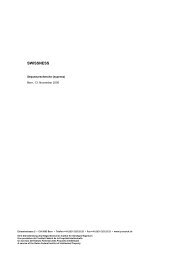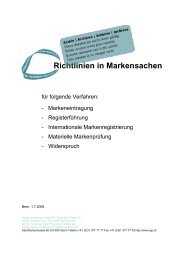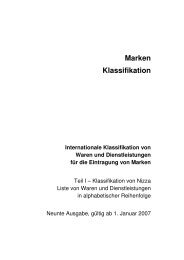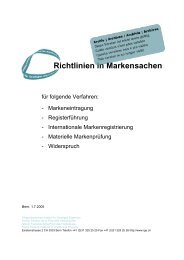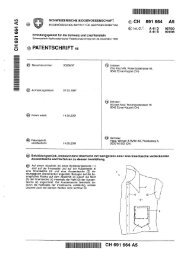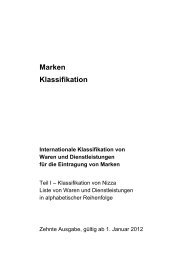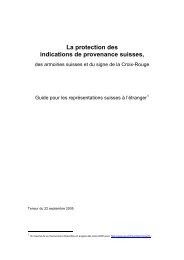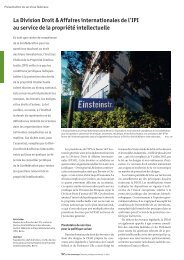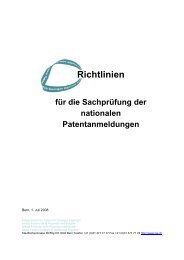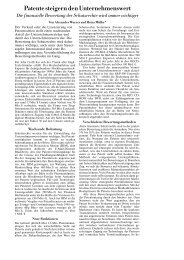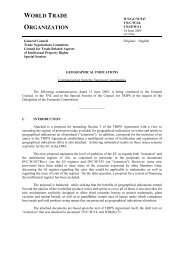AVIS DE DROIT PROTECTION DES SIGNES NATIONAUX
AVIS DE DROIT PROTECTION DES SIGNES NATIONAUX
AVIS DE DROIT PROTECTION DES SIGNES NATIONAUX
You also want an ePaper? Increase the reach of your titles
YUMPU automatically turns print PDFs into web optimized ePapers that Google loves.
ROYAUME-UNI<br />
may be tested for truthfulness in respect of all of the goods belonging to that class, including<br />
those goods which have not yet come into existence. It has been held 307 , in addition, that<br />
where an advertisement for goods is false, the offence is committed each time a potential<br />
consumer reads or hears the advertisement. The relatively low fine 308 that can be imposed<br />
upon a summarily convicted offender may therefore be imposed many times over, although<br />
this is subject to evidence of whether the offender actually knew that his statements were<br />
false, of the commercial advantage which he obtained from the false trade description and of<br />
his real ability to pay the fines 309 . Sec. 34 specifies that a trade description may be constituted<br />
by or included in a trade mark and the fact that the mark is registered would not prevent<br />
conviction of a criminal offence if the description were false. Specific criminal offences<br />
punish false claims by traders that their goods or services are supplied to, or approved by, or<br />
of a kind that is supplied to or approved by, Her Majesty or any member of the royal family,<br />
as well as use of the Queen’s Award to Industry without having Her Majesty’s authority to do<br />
so; Trade Descriptions Act 1968, subsecs. 12(1) and (2). A person who, while in the United<br />
Kingdom, induces or assists another person, outside the United Kingdom, to apply a false<br />
trade description to goods to the effect that they or any part of them were made in the United<br />
Kingdom, or to supply or offer goods under such a false description, can be convicted as an<br />
accessory to the principal offence of false trade description; Trade Descriptions Act 1968,<br />
subpara. 21(1)(a). Where a false appellation of origin, regardless of the country referred to, is<br />
applied to goods outside the United Kingdom, they may not be imported into the United<br />
Kingdom. Goods are deemed to have been made, or more precisely manufactured, for that<br />
purpose in which they were last substantially changed; Trade Descriptions Act 1968, subsec.<br />
36(1). A person who contravenes this prohibition does not commit a criminal offence, but is<br />
subject to an administrative penalty and the goods to forfeiture under the Customs and Excise<br />
Management Act 1979.<br />
The British government has the power, under the Chartered Associations (Protection of<br />
Names and Uniforms) Act 1926, to designate individual public interest organisations as<br />
protected from commercial exploitation. Under the first paragraph of subsec. 1(4), it is a<br />
criminal offence for anyone to use the name, uniform or badge of an organisation which has<br />
been so designated, or the term by which its members are commonly known, without having<br />
obtained the approval of that organisation. The only statutory exception is for use as part of a<br />
stage play, circus performance, pageant or cinematographic film. Each unauthorised use may<br />
result in a criminal conviction and a fine of up to £200. Among the organisations which have<br />
been designated as protected under this legislation are the Royal Life Saving Society, the<br />
Venerable Order of St. John of Jerusalem (which provides ambulance services in the United<br />
Kingdom) and the British Legion (which represents the interests of ex-servicemen and –<br />
women).<br />
A civil remedy for the protection of goods belonging to a class with an established trade<br />
reputation has been available since the end of the 1970s. Until then, a manufacturer of goods<br />
could sue in the tort of “passing off” only when a competitor falsely presented his goods in<br />
307<br />
By the Judicial Committee of the House of Lords in Wings Ltd. v. Ellis, [1985] Law Reports, Appeal<br />
Cases 272.<br />
308<br />
Currently a maximum of £5’000, under subsec. 143(1) of the Magistrates’ Courts Act 1980, as<br />
amended.<br />
309<br />
Refer to the jurisprudence cited in Halsbury’s Laws of England, op. cit, Vol. 41, Title “Sale of Goods<br />
and Supply of Services”, para. 498, in the second paragraph of footnote 2.<br />
196



